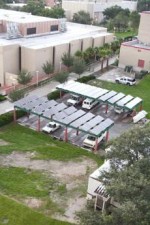USF receives federal money to research new energy sources

USF has been given a total of $8.75 million to help develop renewable energy systems and to educate students about the renewable energy industry over the next three years.
The money comes from a bill passed by state legislature in April called the Florida Energy Systems Consortium. Florida Gov. Charlie Crist signed the bill into law June 25.
According to a press release, Crist said that this law will “leverage the expertise of Florida’s research community to grow Florida’s green-tech industry.”
Yogi Goswami, co-director of the Clean Energy Research Center (CERC) and chemical engineering professor, said that the University already has some environmental research in the works.
“We have a number of research projects to help the state solve the energy problems in environmentally safe ways,” Goswami said.
The Consortium project is a joint effort with various state universities.
As head of the project, the University of Florida (UF) will receive $15 million, while USF joins Florida Atlantic University, Florida State University and the University of Central Florida in receiving $8.75 million each. UF will receive more money because of its leadership and administrative responsibilities, according to a press release from UF.
This is the first time that Florida’s university researchers will work together to solve the energy problem, Goswami said.
He said that each school has its strengths.
USF’s strengths are solar energy, clean transportation, carbon capture and sequestration, bio-fuels and distributed power generation. Carbon capture and sequestration is the process of capturing carbon dioxide from placesww such as power plants and industrial sites and moving it to suitable locations, according to the World Resources Institute. Distributed power generation, according to the U.S. Department of Energy, uses small electric generators that avoid power losses and decrease emissions.
Sesha S. Srinivasan, a senior researcher at CERC, said the Consortium project is very encouraging for the state and the universities.
“We are in an energy crisis,” Srinivasan said. “The gasoline prices have heightened up and we need to find some alternate resources for fueling in the future.”
Another aspect of the Consortium project is education. Goswami will teach a solar energy class in the fall and will have more available during the spring.
“We hope to be able to add more classes and programs, including a master’s program,” he said.
Goswami said the programs are available to all students, not just those concentrating in science or engineering.
“In order for us to solve the energy problem in the state (in a sustainable and environmentally safe manner), it will take contributions from various disciplines,” he said.





